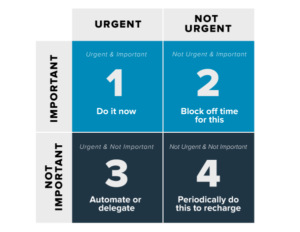 Making decisions about controlling your time and utilizing your talent requires you to be thoughtful and strategic. One of the first steps on this path is to learn the difference between “urgent” and “important” tasks.
Making decisions about controlling your time and utilizing your talent requires you to be thoughtful and strategic. One of the first steps on this path is to learn the difference between “urgent” and “important” tasks.
Don’t mistake urgency for importance. Don’t think that because a fire is burning it warrants your immediate attention every single time. Often the fires will burn themselves out. And don’t think that endlessly jumping from one thing to another is good leadership.
Have you ever had a day when you feel you worked your ass off and got nothing done? That was a day when you decided to focus on urgent issues instead of important ones.
If you look at the box above, you can easily see how to categorize any task that needs your attention. Everything you do fits into one of the boxes numbered one through four. Let’s take a look at what might fit into these boxes:
Box 1: Urgent and Important (Take Action Now)
These are things that need attention now. Both the critical nature of the issue and immediate timing combine in this box. Some examples would be:
- Responses to key clients
- Decisions where time or money is on the line
- Deadline-driven projects, tasks or important commitments
- Critical decisions that cannot be made by subordinates
Box 2: Important but Not Urgent (Be Proactive)
There are things that are important but often don’t jump out as vital. Time spent on these things, though, directly improves the bottom-line results of the organization. Ignore these tasks at your peril. Examples of important-but-not-urgent tasks would include:
- Planning
- Evaluating people
- Evaluating systems
- Client relationship building
Box 3: Urgent but Not Important (Don’t Be Reactive)
These are things that are time-driven and may or may not be worthy of your action. Because of habit or others’ needs, we can sometimes get lost in urgent-but-not-important activities, which become matters of “daily firefighting.” A lot of work is involved but not much really gets done. Some urgent –but-not-important items include:
- 50% of all phone calls
- 80% of all email
- 95% of text messages
- Problems brought to you by others for you to solve that they have not tried to solve themselves
- Personnel issues that can and should wait
- Any form of employee venting, frustration, or emotional dumping that does not lead to resolutions
Box 4: Not Important and Not Urgent (Be Disciplined and Ignore)
We live in a multitasking world where immediate reaction is standard behavior. Young people especially think they need to respond moment-to-moment via email or social media. This is indulgent and simply a bad habit to be addressed. This is a key area where major chunks of time are wasted.
Poor planners fill their time by focusing on tasks that are neither urgent nor important. It’s the stuff people do when they are reactive instead of proactive. It means inaction. This is bad stuff.
So there it is. A simple matrix to getting shit done. Important stuff – not everything all the time; not what you like to do and are good at; not what other people want you to do for them.
